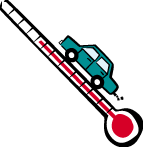 While the Earth Summit + 5 is going on, world leaders are discussing action plans that will create sustainable development around the globe. But what can we do in our own lives to reduce our ecological impact in our own human environments? This column will present one idea each day. Our purpose is to provide ways that we in our lives can reduce our own "ecological footprint"...
|
|
|
Climate change is a complicated issue. It's hard to get a handle on the scientific issues, never mind the political problems that are going on, as governments try to agree on how to tackle the problem. Our own eco-footprints in terms of climate change are very important. Why? A huge portion of pollution and air emissions that we have in the world today is from the increasing number of cars in the world. Twenty per cent of the world's threatening greenhouse gases are from cars and airplanes. In fact, there is a car produced more often than a baby is born in the world each day. So imagine how many cars are being created every day! |
How can you reduce your contributions to the greenhouse effect? Simply not driving can be a powerful first step. In our lives every day, there are tasks we must do that are made easy and convenient and often it's a habit just to drive. As a young person, I love to get into the car, listen to music and "clear my head." But this kind of recreational driving, the driving that we all do occasionally, is something that we can cut down on.
If we as individuals stop or reduce our driving, the 20 per cent emissions rate can be reduced drastically. Also realisze that by being a visible person engaging in alternate modes of transportation, you are becoming an important voice in the movement to make cities "walker" and "biker" friendly.
As always, telling people why you are doing what you are doing may influence others to change their own ways. As you walk to school, to work, and to the local grocery store, you are an important part of the movement for change. A car makes a heavier "eco-imprint" than your own two feet!

